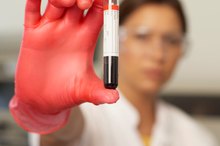Normal Urinary Output for an Adult
The amount of urine your body produces in a day can be directly related to your health. The kidneys' main function is to maintain the correct balance of water and various chemicals in your blood 3. If your kidneys aren't functioning properly, an increase or decrease in urinary output could indicate the presence of kidney disease. As of 2013, kidney disease is the eighth leading cause of death in the U.S., according to the Centers for Disease Control and Prevention.
Urine Formation
The kidneys remove waste products from your blood and expel them in your urine. They accomplish this by filtering your blood. Your kidneys reabsorb the molecules, nutrients and water your body needs and excrete concentrated waste products. When the kidneys aren't functioning properly, waste and fluid that are typically removed from your body in the urine can accumulate and cause disease.
- The kidneys remove waste products from your blood and expel them in your urine.
- Your kidneys reabsorb the molecules, nutrients and water your body needs and excrete concentrated waste products.
Normal Urinary Output
Grapefruit Juice & Kidney Stones
Learn More
The normal range for an adult urinary output is between 400 to 2,000 mL of urine daily -- with a normal fluid intake of about 2 liters per day. Values for normal urinary output may vary slightly between laboratories. A urine output of 500 mL per day is generally considered adequate for normal function.
Factors other than kidney disease that can influence how much you urinate in a day include how much water you consume, the amount of fluid lost in perspiration, your caffeine and alcohol intake and any medications you've taken. If your doctor is concerned about your kidneys, a 24-hour urine collection test is typically ordered.
- The normal range for an adult urinary output is between 400 to 2,000 mL of urine daily -- with a normal fluid intake of about 2 liters per day.
- A urine output of 500 mL per day is generally considered adequate for normal function.
Related Articles
References
- National Vital Statistics Reports: Deaths: Final Data for 2010
- Tietz Fundamentals of Clinical Chemistry; Carl Burtis, Ph.D., et al.
- Clinical Chemistry: Theory, Analysis, and Correlation; Lawrence Kaplan, et al.
- U.S. National Library of Medicine. MedlinePlus. Urinalysis. Updated April, 8 2019
- National Kidney Foundation. Tests to measure kidney function, damage and detect abnormalities
- University of Rochester Medical Center. Health Encyclopedia. Blood urea nitrogen.
- Johns Hopkins Medicine. 24-hour urine collection.
- Renal Panel. Lab Tests Online.
Writer Bio
Leann Mikesh holds a Ph.D. in pathology. She has trained at the University of Virginia Medical Laboratories and has over 15 years experience in clinical, cancer and immunology research. Dr. Mikesh performed kidney and bone marrow transplantation compatibility testing to put herself through graduate school.








